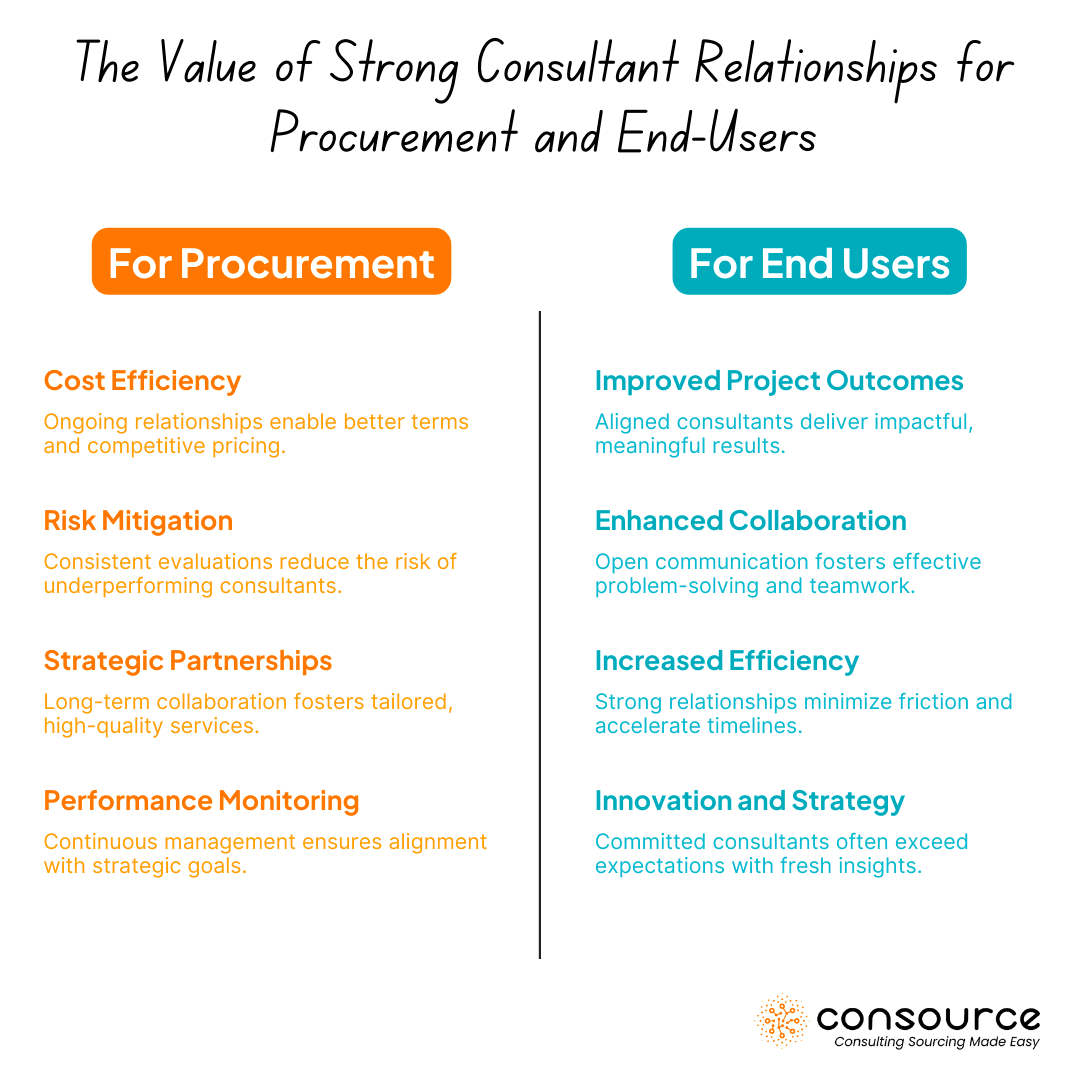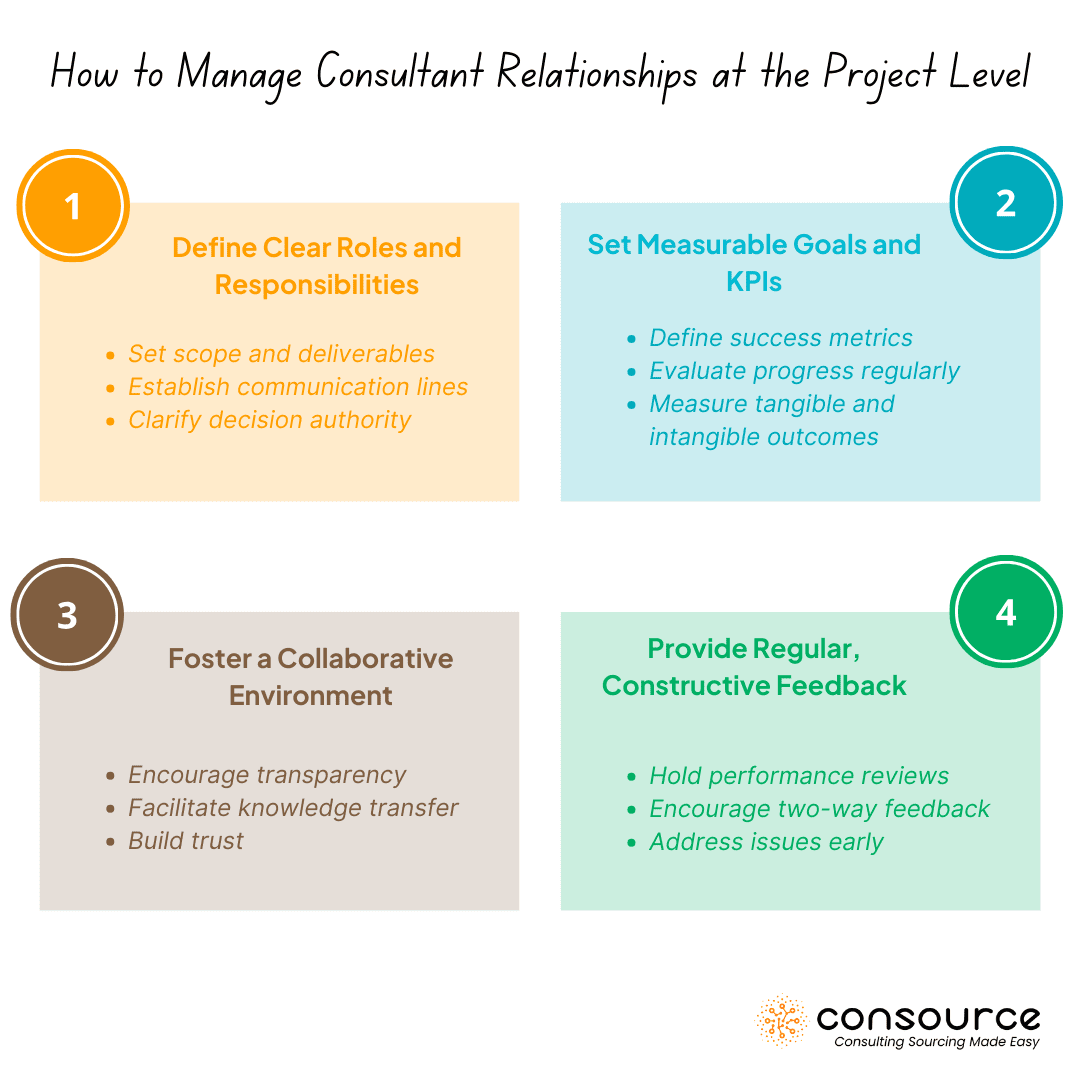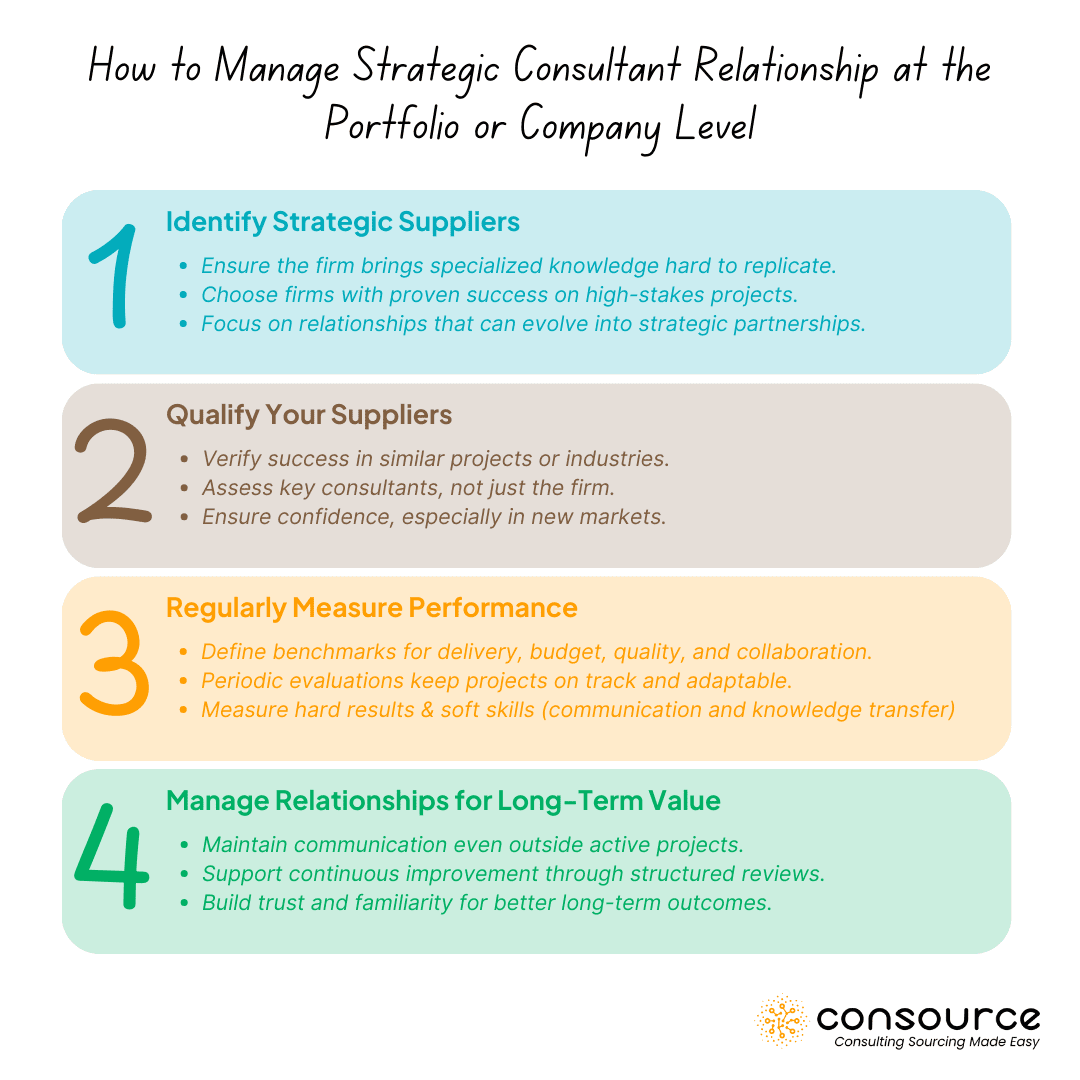Projetos bem-sucedidos são o resultado de parcerias sólidas, e talvez nenhuma seja tão importante quanto o relacionamento que você cultiva com seus consultores. No atual ambiente de negócios em ritmo acelerado, os projetos geralmente exigem conhecimento especializado e experiência externa para atingir os objetivos.
É aí que entram os consultores - fornecendo não apenas as habilidades e a visão estratégica necessárias para seus projetos, mas também uma nova perspectiva que pode ser inestimável. Entretanto, a simples contratação de um consultor não é suficiente. A verdadeira mágica acontece quando você gerencia e nutre ativamente o relacionamento entre sua empresa e seus parceiros de consultoria.
Este artigo abordará a importância de criar relacionamentos sólidos com consultores, tanto para o setor de compras quanto para os usuários finais, e oferecerá insights práticos sobre o gerenciamento desses relacionamentos em nível de projeto e de portfólio. Em última análise, o objetivo é capacitá-lo com estratégias que garantam que seus contratos de consultoria ofereçam o máximo de valor.
Por que criar relacionamentos sólidos com consultores é importante tanto para o setor de compras quanto para os usuários finais
Independentemente de você fazer parte da equipe de compras ou estar na linha de frente como usuário final gerenciando um projeto, o sucesso de qualquer contrato de consultoria está em a força da relação de trabalho. Veja por que esse relacionamento é crucial tanto para a aquisição quanto para os usuários finais, e como ele afeta diretamente os resultados do projeto.
Para o setor de compras: Otimização de recursos e gerenciamento de riscos
Do ponto de vista da aquisição, a meta geralmente é maximizar o valor derivado de fornecedores externos - inclusive consultores - enquanto gerencia os custos, garante a conformidade e reduz os riscos.
Você é responsável por selecionar os parceiros de consultoria certos, negociar os melhores acordos e garantir que essas parcerias estejam alinhadas com as metas estratégicas mais amplas da sua empresa. À primeira vista, os serviços de consultoria podem parecer intangíveis, mas representam um investimento significativo, que exige um gerenciamento cuidadoso.
Ao manter um relacionamento sólido com os consultores, as equipes de compras podem obter inúmeros benefícios:
- Eficiência de custo: Ao promover relacionamentos contínuos com os consultores, o setor de compras pode negociar melhores termos e garantir que os futuros contratos ofereçam preços competitivos.
- Mitigação de riscos: Processos de qualificação consistentes, combinados com avaliações regulares de desempenho, reduzem a probabilidade de contratação de consultores com desempenho insuficiente ou inadequado.
- Parcerias estratégicas: Os relacionamentos de longo prazo podem transformar os fornecedores transacionais em parceiros confiáveis que investem genuinamente no sucesso da empresa, o que geralmente leva a serviços mais personalizados e de maior qualidade.
A função da equipe de aquisições não termina com a assinatura do contrato; o gerenciamento e a avaliação contínuos do desempenho do consultor durante todo o ciclo de vida do projeto são essenciais para garantir que você obtenha o melhor retorno para o seu investimento.
Para usuários finais: Impulsionando o sucesso do projeto
Para o usuário final, os consultores costumam ser vistos pela lente de quão bem eles se integram à equipe do projeto e contribuem para atingir os objetivos do projeto. Em outras palavras, a capacidade do consultor de se alinhar às necessidades do projeto é fundamental.
A qualidade desse relacionamento determina tudo - desde a clareza da comunicação até a rapidez com que os problemas são resolvidos. Um bom consultor não apenas atende às expectativas, mas muitas vezes as supera, trazendo novas ideias e estratégias que podem reformular os resultados do projeto para melhor.
Quando os usuários finais mantêm uma relação de trabalho saudável com os consultores, eles obtêm vários benefícios importantes:
- Resultados aprimorados do projeto: Um consultor que entende os objetivos do projeto e a dinâmica interna da empresa está mais bem equipado para fornecer resultados significativos.
- Colaboração aprimorada: Um forte relacionamento entre os usuários finais e os consultores leva a uma comunicação aberta, à solução de problemas e a uma relação de trabalho mais produtiva.
- Aumento da eficiência: Um relacionamento bem gerenciado com o consultor reduz o atrito e acelera os cronogramas do projeto, garantindo que os resultados sejam cumpridos no prazo.
Em termos simples, os consultores que investem no sucesso do projeto - e do relacionamento - têm maior probabilidade de se esforçar para garantir os melhores resultados.

Gerenciando relacionamentos com consultores no nível do projeto: como fazer isso corretamente
Gerenciar consultores de forma eficaz em nível de projeto requer mais do que apenas supervisão. É necessário definir as expectativas corretas, garantir uma comunicação clara e promover um ambiente de colaboração. A seguir, descrevemos as etapas práticas para gerenciar os relacionamentos com consultores de forma a beneficiar tanto a equipe interna quanto o consultor.
1. Definir funções e responsabilidades claras
A ambiguidade é um terreno fértil para o conflito e a ineficiência. Desde o início, ambos equipes internas e os consultores precisam ter clareza sobre suas respectivas funções. Definir quem é responsável pelo quê garante a responsabilidade e evita sobreposições ou lacunas na execução.
Principais ações:
- Criar um escopo de trabalho detalhado: Defina os resultados do projeto, os cronogramas e quem é responsável por cada aspecto do projeto.
- Estabelecer linhas de comunicação claras: Isso ajuda a evitar confusão no futuro. Pontos de contato regulares - reuniões semanais, relatórios de status - garantem que todos estejam na mesma página.
- Esclarecer a autoridade decisória: Certifique-se de que haja um entendimento claro de quem tem a palavra final nas principais decisões, especialmente em situações que possam exigir mudanças rápidas.
Dessa forma, você evita o temido cenário de "muitos cozinheiros na cozinha", e seus consultores podem se concentrar em fornecer valor em vez de descobrir com quem falar.
2. Definir metas mensuráveis e KPIs
Para que os consultores sejam eficazes, eles precisam saber exatamente o que é sucesso do seu ponto de vista. A definição de indicadores-chave de desempenho (KPIs) e o estabelecimento de metas mensuráveis garantem que ambas as partes estejam alinhadas em termos de expectativas e resultados desejados.
Principais ações:
- Defina antecipadamente as métricas de sucesso: Isso inclui parâmetros de tempo, custo e qualidade. A definição dessas expectativas desde o início permite uma trajetória de projeto mais suave.
- Avaliar regularmente o progresso: Para projetos com duração de vários meses, a realização de avaliações no meio do projeto pode ajudá-lo a identificar as áreas em que podem ser necessários ajustes. É muito mais fácil corrigir o curso no meio do caminho do que após a conclusão do projeto.
- Avaliar os resultados tangíveis e intangíveis: Embora você possa ter definido metas financeiras específicas ou baseadas no tempo, considere também os aspectos intangíveis, como a transferência de conhecimento, a satisfação do cliente e a capacidade do consultor de se adaptar a desafios imprevistos.
Uma regra simples: se você não pode medir, não pode gerenciar. Ao estabelecer KPIs claros, você terá uma noção melhor se o envolvimento está ou não indo na direção certa.
3. Promover um ambiente colaborativo
Os consultores não estão lá apenas para fornecer resultados; eles são parceiros para ajudá-lo a atingir seus objetivos. A criação de um ambiente colaborativo garante que tanto a sua equipe quanto o consultor possam trabalhar juntos de forma produtiva.
Principais ações:
- Promover a transparência: Incentive a comunicação aberta sobre desafios, contratempos ou oportunidades inesperadas. Os consultores devem se sentir à vontade para levantar questões e sugerir soluções.
- Facilitar a transferência de conhecimento: Um dos principais valores que os consultores podem trazer é seu conhecimento e experiência. Certifique-se de que esse conhecimento esteja sendo transferido para a sua equipe interna durante todo o projeto, e não apenas no final.
- Criar confiança: A confiança é a base de qualquer parceria bem-sucedida. Crie confiança envolvendo os consultores desde o início nos processos de tomada de decisão e reconhecendo suas contribuições.
Lembre-se de que um consultor é tão bom quanto o relacionamento dele com a sua equipe. Se a colaboração e a comunicação não forem bem-sucedidas, nem mesmo os melhores consultores serão capazes de entregar o trabalho.
4. Forneça feedback regular e construtivo
O feedback é um presente - tanto para os consultores quanto para eles. O fornecimento regular de feedback garante que os consultores permaneçam alinhados com as metas do projeto e possam fazer melhorias quando necessário.
Principais ações:
- Conduzir avaliações formais de desempenho: Realizar avaliações formais em intervalos regulares para fornecer feedback estruturado sobre o desempenho do consultor.
- Incentivar o feedback bidirecional: Os consultores geralmente têm percepções valiosas sobre sua organização. Convide-os a fornecer feedback sobre como sua equipe pode trabalhar com eles de forma mais eficaz, melhorando a dinâmica geral.
- Tratar os problemas com antecedência: Se algo não estiver funcionando, não espere até o final do projeto para falar sobre isso. Quanto mais cedo você abordar as preocupações, mais fácil será resolvê-las.
O feedback construtivo ajuda a manter o projeto no caminho certo e incentiva o consultor a ajustar sua abordagem conforme necessário, garantindo uma colaboração mais tranquila e bem-sucedida.

Gerenciamento de relacionamentos com consultores no nível do portfólio ou da empresa: Gerenciamento estratégico de relacionamentos
No nível da empresa ou do portfólio, o gerenciamento de consultores requer uma abordagem mais estratégica. É nesse ponto que as equipes de aquisição geralmente assumem a liderança, trabalhando para garantir que os contratos de consultoria estejam alinhados com as metas organizacionais mais amplas, promovam o valor de longo prazo e gerem resultados consistentes em todos os projetos.
1. Identifique corretamente seus fornecedores estratégicos
Nem todos os consultores são criados da mesma forma e nem todos terão o mesmo impacto em seus negócios. O setor de compras deve identificar quais consultores são parceiros estratégicos - aqueles que trazem conhecimentos exclusivos e são vitais para os projetos mais importantes da organização.
Critérios-chave para a identificação estratégica de fornecedores:
- Experiência única: A empresa de consultoria traz conhecimento especializado que não pode ser facilmente obtido em outro lugar?
- Impacto em projetos estratégicos: Eles comprovaram sua capacidade de gerar resultados em projetos de alto impacto?
- Potencial de longo prazo: O relacionamento pode evoluir para uma parceria de longo prazo, proporcionando valor sustentável ao longo do tempo?
A escolha dos consultores certos como parceiros estratégicos permite que sua empresa crie um grupo de especialistas confiáveis que estão intimamente familiarizados com sua empresa e seus objetivos de longo prazo.
2. Sempre qualifique seus fornecedores
Antes de contratar qualquer empresa de consultoria, um processo de qualificação completo garante que ela não apenas esteja equipada para lidar com o projeto em questão, mas também esteja alinhada com a cultura e os valores de sua empresa.
Principais ações para qualificação:
- Verificar referências relevantes: Certifique-se de que a empresa tenha um histórico de sucesso em projetos semelhantes, principalmente no seu setor.
- Avaliar indivíduos, não apenas empresas: Os consultores individuais - especialmente aqueles que lideram o projeto - desempenham um papel crucial no sucesso do compromisso. Certifique-se de que as pessoas envolvidas tenham as habilidades e as qualidades interpessoais certas para trabalhar bem com a sua equipe.
- Solicitar referências adicionais, se necessário: Não hesite em solicitar validação adicional, especialmente quando estiver entrando em um novo mercado ou área de capacidade.
Os processos de qualificação garantem que você evite contratar a empresa errada e preparam o terreno para a entrega bem-sucedida do projeto.
3. Medir regularmente o desempenho do fornecedor
O desempenho de um consultor não deve ser avaliado uma vez por ano ou ao final de um projeto. Para garantir que você esteja recebendo consistentemente o valor esperado, a avaliação do desempenho deve ocorrer durante todo o ciclo de vida do relacionamento.
Para compromissos mais curtos, faz sentido avaliar o desempenho no final de cada projeto. Para projetos de longo prazo, o desempenho deve ser avaliado nos principais marcos ou momentos críticos para garantir que o projeto permaneça no caminho certo e que as correções de curso necessárias sejam implementadas com antecedência.
A medição do desempenho não é apenas algo "agradável de se ter"; ela é fundamental para a responsabilidade e para garantir que o consultor forneça consistentemente valor alinhado com as metas de sua empresa.
Principais ações para medição de desempenho:
- Defina KPIs claros desde o início: É fundamental estabelecer indicadores-chave de desempenho (KPIs) claros e mensuráveis desde o início. Os KPIs devem refletir o que é sucesso para o seu projeto, incluindo referências de tempo, qualidade e custo. Mas não se trata apenas de números - os KPIs também devem abranger fatores menos tangíveis, como a satisfação das partes interessadas e a transferência de conhecimento.
- Exemplos de KPIs para projetos de consultoria:
- Entrega pontual de marcos ou produtos
- Cumprimento do orçamento e da alocação de recursos
- Qualidade e impacto dos resultados (conforme avaliado pelas principais partes interessadas)
- Grau de transferência de conhecimento para as equipes internas
- Satisfação das partes interessadas com a comunicação e a colaboração
- Exemplos de KPIs para projetos de consultoria:
- Conduzir avaliações intermediárias do projeto: Para projetos que se estendem por vários meses ou mais, é vantajoso realizar avaliações periódicas de desempenho. As avaliações no meio do projeto oferecem a oportunidade de avaliar o progresso e abordar quaisquer problemas potenciais antes que se tornem críticos. Essas avaliações também podem servir como uma oportunidade para recalibrar, caso tenha havido alguma mudança nos objetivos do projeto ou fatores externos que o afetem.
- Avalie os fatores quantitativos e qualitativos: Embora o cumprimento dos prazos e a permanência dentro do orçamento sejam cruciais, há outros fatores mais suaves que são igualmente importantes. Por exemplo, até que ponto o consultor está se comunicando bem com a sua equipe? Ele está transferindo seus conhecimentos para as equipes internas de forma eficaz? Ele recebe bem o feedback e ajusta sua abordagem conforme necessário? Esses fatores qualitativos muitas vezes podem ser decisivos para o sucesso de um contrato de consultoria.
Medição sistemática e padronizada
Para garantir a consistência e a comparabilidade entre diferentes projetos e trabalhos de consultoria, é essencial implementar um sistema de avaliação padronizado. Isso permite consolidar o feedback de forma estruturada, facilitando a identificação de tendências, a identificação de áreas de melhoria e a avaliação do desempenho geral do consultor ao longo do tempo.
Uma abordagem sistemática garante que todos os consultores sejam submetidos aos mesmos padrões de desempenho, permitindo uma tomada de decisão mais objetiva ao determinar a renovação de contratos ou a realização de ajustes.
- Critérios de avaliação padronizados:
- Desempenho de entrega: O consultor cumpriu os prazos e entregou os marcos acordados?
- Valor entregue: A solução ou a entrega foi impactante e resolveu o problema ou atendeu à necessidade?
- Desempenho de custos: O consultor se manteve dentro do orçamento ou houve custos excedentes imprevistos?
- Comunicação e colaboração: A comunicação do consultor foi clara, consistente e colaborativa com suas equipes internas?
- Transferência de conhecimento: O consultor transferiu efetivamente seus conhecimentos para as equipes internas, garantindo que a organização possa manter a continuidade após o término do contrato?
A medição padronizada do desempenho ajuda você não apenas a responsabilizar os consultores, mas também a obter feedback acionável que pode melhorar os futuros compromissos. Isso cria um ciclo de feedback que fortalece os relacionamentos e permite a melhoria contínua em ambos os lados da mesa.
Ao adotar uma abordagem sistemática e estruturada para a avaliação de desempenho, você garante que cada contrato de consultoria seja mantido em um alto padrão, proporcionando à sua organização resultados consistentes e de alto valor todas as vezes. Esse método não apenas ajuda a identificar precocemente os consultores com baixo desempenho, mas também destaca aqueles que superam as expectativas de forma consistente, proporcionando uma base sólida para parcerias estratégicas de longo prazo.
4. Gerencie os relacionamentos para obter valor a longo prazo
Gerenciar relacionamentos em nível de portfólio significa pensar além de projetos individuais e focar no valor de longo prazo de seus relacionamentos com consultores. Isso requer um gerenciamento estratégico do setor de compras para garantir que os consultores estejam contribuindo para as metas mais amplas da empresa.
Principais ações:
- Faça check-ins regulares: Mesmo quando um projeto não estiver sendo executado ativamente, mantenha uma comunicação regular com os principais parceiros de consultoria.
- Fornecer feedback contínuo: Os relacionamentos de longo prazo se beneficiam da melhoria contínua, portanto, certifique-se de fornecer feedback mesmo após a conclusão do projeto.
- Cultivar parcerias de longo prazo: Construa relacionamentos sólidos e duradouros com empresas de consultoria estratégica. Essas parcerias geralmente produzem os melhores resultados ao longo do tempo, pois os consultores se familiarizam mais com sua empresa e seus desafios.
Ao gerenciar os relacionamentos para obter valor a longo prazo, sua empresa não apenas garante melhores resultados para projetos individuais, mas também desenvolve uma rede confiável de parceiros de consultoria que podem apoiar o crescimento contínuo dos negócios.

Conclusão
A criação e o gerenciamento de relacionamentos sólidos com consultores são fundamentais para o sucesso de seus projetos e para a saúde de longo prazo de sua organização. Quer você faça parte da equipe de aquisições ou seja um líder de projeto que trabalha diretamente com os consultores, as estratégias descritas neste artigo o ajudarão a maximizar o valor desses relacionamentos. Ao definir funções claras, estabelecer metas mensuráveis, promover a colaboração e fornecer feedback regular, você pode garantir que seus consultores forneçam resultados excepcionais.
No âmbito da empresa, a supervisão estratégica do setor de compras garante que esses relacionamentos contribuam para os objetivos mais amplos da organização, proporcionando valor a longo prazo e impulsionando o sucesso dos negócios.
Os consultores são mais do que simples prestadores de serviços externos - eles são parceiros fundamentais para o sucesso de sua empresa. Ao investir tempo e esforço para gerenciar esses relacionamentos de forma eficaz, você poderá liberar todo o potencial de seus compromissos com consultores e gerar melhores resultados para sua empresa.
Perguntas Mais Frequentes
1. Por que um relacionamento sólido com os consultores é importante para a aquisição?
Um relacionamento sólido com os consultores garante que as equipes de compras maximizem o valor de seu investimento, minimizem os riscos e criem parcerias estratégicas que levem a melhores condições, colaboração de longo prazo e contratos de consultoria mais eficazes.
2. Quais são os principais indicadores de desempenho (KPIs) para avaliar os consultores?
Alguns KPIs importantes para avaliar os consultores incluem os prazos de entrega do projeto, o cumprimento do orçamento, a qualidade dos resultados, a satisfação das partes interessadas e a capacidade do consultor de transferir conhecimento e se adaptar às necessidades de sua empresa.
3. Como posso melhorar a colaboração entre minha equipe interna e os consultores?
Promova a transparência estabelecendo expectativas claras, criando pontos de contato regulares e incentivando a comunicação aberta. Facilite o compartilhamento de conhecimento e crie confiança envolvendo os consultores na tomada de decisões e reconhecendo suas contribuições para o projeto.
4. Como você mede o desempenho dos consultores em projetos de longo prazo?
Em projetos de longo prazo, o desempenho deve ser avaliado em marcos importantes para garantir que o projeto esteja no caminho certo. As avaliações no meio do projeto ajudam a abordar os possíveis problemas com antecedência e oferecem uma oportunidade para a correção do curso. Deve-se aplicar uma abordagem sistemática de avaliação de desempenho, com critérios quantitativos e qualitativos.
5. Quais são os riscos de não gerenciar os relacionamentos com os consultores de forma eficaz?
O mau gerenciamento das relações com os consultores pode resultar em metas desalinhadas, atrasos, custos mais altos, comunicação deficiente e, por fim, no fracasso do projeto. Sem avaliações regulares de desempenho e comunicação clara, é difícil garantir que os consultores forneçam o valor esperado.








0 comentários